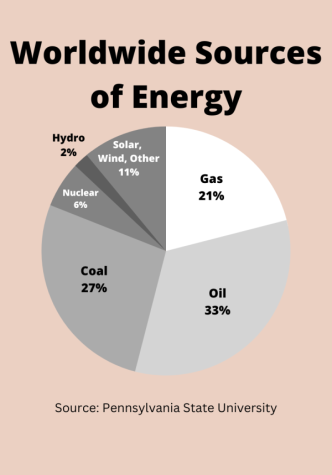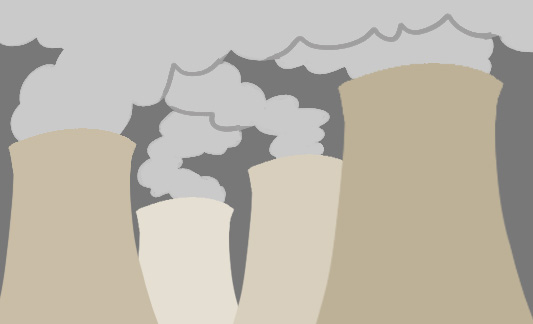Since late 2021, the world fossil fuels market has seen unprecedented hikes in the costs of oil and natural gas. Across Europe, the impact of the crisis is being felt in real time by the common citizen as the prices of oil and gas jump high into unaffordable ranges.
Even taking into account factors such as inflation and fluctuations in price markers such as the Dutch Title Transfer Facility futures index, which serves as a virtual indicator of natural gas futures and could be subject to large fluctuations, it is no exaggeration to say that this energy crisis is one of the worst in decades. Indeed, some organizations like the International Energy Agency have called the situation “the world’s first truly global energy crisis in history.”
“It is severe, and it is going to get worse,” DePaul finance professor Werner De Bondt said. “In Europe, whole industries are closing down. Fertilizer firms in Belgium, the fishing industry in Italy, the pubs in England. It is happening all over the EU.”
As the situation progresses, the loss of cheap energy and increasing inflation rates are quickly leading to stagflation, not unlike the energy crisis of the 1970s, where an embargo on the Western World by OPEC nations resulted in high levels of inflation.
Outside of Europe, developing nations that import energy are taking a serious hit. The first country that reached a tipping point was Sri Lanka, which defaulted earlier this year.
“We are witnessing the impoverishment of the European continent,” De Bondt said.
The Russo-Ukrainian conflict and the retaliating U.S. and EU sanctions exacerbate the effects of the emergency. Russia, one of the world’s foremost oil and natural gas producers, has been engaging in economic tussles with Western countries that are generally in support of Ukraine since the beginning of the war.
With the war having no end in sight, the rise in oil prices and decrease in production is proving to be unbearable for many. Potential anesthetics such as the Nord Stream pipelines linking Russia and Central Europe remain blocked due to the war.
According to DePaul economics professor Animesh Ghoshal, natural gas dependency on Russia is also taking a heavy toll on countries such as Italy, especially in a time when the flow is susceptible to being cut off.
The magnitude of the crisis cannot be attributed to the war alone. Some experts now agree that issues such as the current global supply chain crisis, Covid-19 recovery issues and disputes over forms of energy generation are the most important precursors to the crisis.
“As the world economy began to recover from the effects of the pandemic, oil demand increased,” Ghoshal said. “At the same time, supply could not keep up. During the pandemic, due to lack of demand, many wells had been capped, and many fracking facilities shut down. These could not be reactivated quickly.”
This is a problem years in the making. Due to technological developments such as electric cars and campaigns for renewable energy and urban air quality, oil production has slowed over the past several years, with expectations that it will eventually peak and decrease afterwards.
These forecasts have played a major role in shelving plans for expansions in oil production and drawing investments away from oil towards renewable sources.
“Global investment in fossil fuels has declined significantly after the global financial crisis, especially after the collapse of oil and commodity prices in 2014-2015,” DePaul economics professor Jaejoon Woo said.

Woo and Ghoshal agree that due to existing pressures on countries and companies to move away from fossil fuels towards renewable sources, these institutions will find themselves woefully unprepared for when the fossil fuels are suddenly in high demand.
“The long-term energy issue is that, of course, the world needs to shift from carbon-based energy sources to other energy sources,” said Linda Tesar, professor of economics at the University of Michigan. “The near-term crisis is that the embargo of imports of energy from Russia has created shortages across Europe and an increase in energy prices more generally.”
The closing of nuclear power plants in several major European powers renders them more dependent on fossil fuels than before.
In Germany, for example, a decades-long policy line of sidelining nuclear power and shutting down nuclear installations have resulted in vulnerability and energy dependence upon fossil fuel-rich foreign powers. This includes, but is not limited to, major geopolitical competitors such as Russia. On the eve of Russia’s war in Ukraine, Germany imported more than half of its gas from Russia, leaving its citizens’ livelihoods tethered to Russia’s policies.
The scarcity of energy on such a large scale leads to an entire list of problems that severely inhibit economic development in European nations.
“There is no economic activity without energy,” De Bondt said.
Important industries, such as the production and refinement of aluminum, zinc, glass and other raw materials, are grinding to a halt due to chronic shortages, and there is no end in sight. European industries will have to endure the coming winter in an energy crunch.
National and industrial leaders have been scrambling in an attempt to apply the brakes to the effects of the crunch.
Germany’s government announced plans to cap energy bills and extend loans to major energy companies, though some believe that these measures can only be short term and do little to actually resolve the underlying issues.
Due to prospects of a recession, predictions for consumption have decreased, and with it, the demand for fuel, according to Woo. This temporarily drives down the oil price and alleviates the crisis somewhat, though it does not constitute a proper solution.
It is a solution that takes out two birds with one stone, securing energy independence for Europe and decreasing dependence on energy imports from Russia and the Middle East.
“The West lacks trusted and trustworthy leadership,” De Bondt said. “We also need more intelligence at the top, but where can we find it?”




